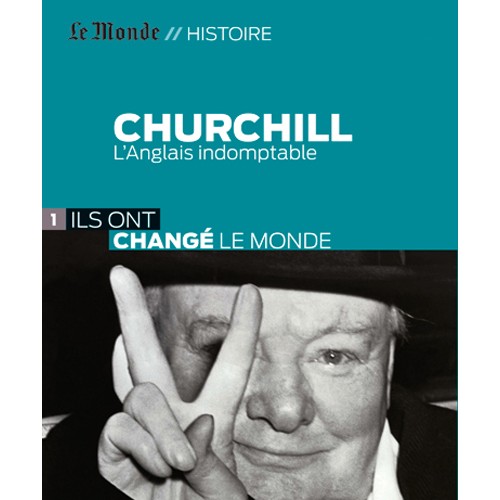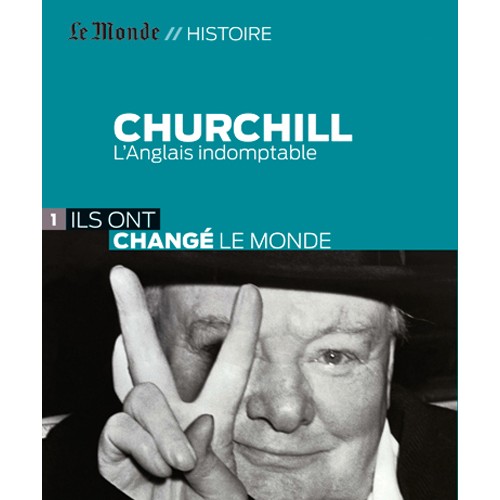
Finest Hour 168
Books, Arts & Curiosities – Winston Churchill—L’Anglais indomptable

September 9, 2015
Finest Hour 168, Spring 2015
Page 46
Review by Antoine Capet
Jean-Pierre Langellier (ed.,) Winston Churchill—L’Anglais indomptable. « Ils ont changé le monde », #1. Paris: Société éditrice du Monde, 2014. 104 pp. €3.99.
 Respected French daily Le Monde has just launched a new series of booklets on the great men who have “changed the world” since the Second World War. What better choice than Churchill to inaugurate it? The formula is both simple and clever: the booklets in the series reproduce articles dealing with the chosen figure which have appeared in the newspaper since its creation in 1944, with a short introduction by the editor—in this instance Jean-Pierre Langellier, who was the journal’s London correspondent in the 1990s.
Respected French daily Le Monde has just launched a new series of booklets on the great men who have “changed the world” since the Second World War. What better choice than Churchill to inaugurate it? The formula is both simple and clever: the booklets in the series reproduce articles dealing with the chosen figure which have appeared in the newspaper since its creation in 1944, with a short introduction by the editor—in this instance Jean-Pierre Langellier, who was the journal’s London correspondent in the 1990s.

2025 International Churchill Conference
The articles are not reproduced chronologically—we first have a warm “Portrait” of Churchill by Henri Pierre—one of Langellier’s predecessors in London—published in January 1985, on the occasion of the twentieth anniversary of Churchill’s death. The first-ever piece in Le Monde specifically devoted to Churchill is an unsigned editorial (in fact written by Hubert Beuve-Méry, the founder of the paper) published 15 May 1945, on the Prime Minister’s broadcast speech of Sunday, 13 May 1945 in which he offered a summary of the main events of the war and the situation as he saw it after Germany’s defeat.
Another unsigned “Bulletin from Abroad,” on 28 July 1945, comments upon the Labour victory. “How can one explain that M. Churchill’s immense prestige was unable to save his party from defeat?” it asks without really giving an answer. The Bulletin ends on a note which one found again in January 2015, in the large number of articles devoted to the fiftieth anniversary of Churchill’s death by the French media: “The French will not see the great statesman that was M. Churchill leave without emotion. Admiring this indomitable character which inspired victory, they cannot forget that in June 1940 he promised to liberate their country and that he kept his promise.”
The Fulton speech of 1946 is covered in a retrospective article of March 1991 which pays tribute to Churchill’s foresight in outlining the path which East-West relations were to take for the next forty-three years. But it concludes on what is presented as a flaw in his reasoning, when he did not see that by staking almost everything on the “Special Relationship” and keeping aloof from European integration, Britain would weaken its influence in the world in the long run.
But the best piece, which surpasses all, has to be the long obituary by Mendès-France (a Deputy with a distinguished war record in the Resistance, briefly Prime Minister in 1954–55) on 26 January 1965. Pierre Mendès-France, a stern judge of politicians, only has glowing praise for Churchill’s achievements: “When one re-reads his instructions and his official documents, in spite of the historical distance, which usually submits past opinions to a cruel light, neither his perception nor his energy is found wanting at any time.”
This attractive collection is illustrated by well-chosen photographs and complemented by a selection of books and films in French, as well as a list of websites. It makes essential reading for anyone interested in the worldwide perception of Churchill— in this instance in France since 1945. An incredible bargain at the price and unreservedly recommended!
Antoine Capet teaches is Professor Emeritus of British Studies at the University of Rouen.
Subscribe
WANT MORE?
Get the Churchill Bulletin delivered to your inbox once a month.



